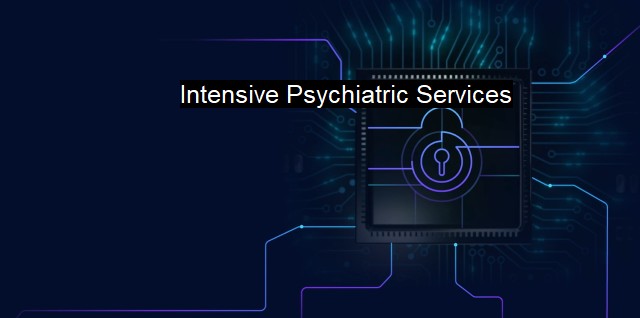What are Intensive Psychiatric Services?
Intensive Psychiatric Services (IPS): A Holistic Approach to Mental Health Treatment in a Structured and Supportive Environment
"Intensive Psychiatric Services" operates in a considerably different framework in healthcare, notably for individuals who require elevated mental support. imagining its application within the milieu of cybersecurity and antivirus, it strengthens our understanding of how cybersecurity functions go beyond technical codes and firewalls, breaking into layers of complex human behavior and how digital health preservation aligns with it.When we speak of "Intensive Psychiatric Services" think of a dedicated section that emphasizes intense user behavior and digital hygiene analysis's psychological aspects. Given the surge in cyber threats like phishing schemes that rely heavily on human interaction, taking a more psychiatric perspective can be instrumental in securing industries against cyber threats.
"Intensive Psychiatric Services" plays a key role in understanding victimology delving deep into the psychological aspects of those who click unsuspectingly on malicious links or provide sensitive information to attackers. This service endeavours to study and comprehend user behavioral patterns that make certain individuals or entities an easy target for cyberattacks, tailoring preventive measures that incorporate human psychology's components.
It observes how the lack of awareness and practice of safe cybersecurity hygiene exposes users to risks. For instance, the disregard for software updates and the use of weak passwords due to convenience aren't merely negligent behaviors but are also rooted in psychological factors such as complacency, resistivity to change, and mental shortcuts. Acknowledging these psychological elements hence becomes pivotal in posing a more holistic defense against cyber threats.
Conversely, this concept would also seek to understand the psychology behind cyber attackers' motivations and preferred methods of exploiting the human element in security systems. By examining the strategic ways hackers trick humans into enabling breaches, such as spear-phishing and social engineering techniques, organizations can develop comprehensive cyber defenses that consider the human factor, beyond the technical and procedural mechanisms generally employed.
In juxtaposition with antivirus functions, understanding these psychological angles allows for more proficient threat detection, prevention, and remediation strategies. Antivirus software primarily focuses on detecting malicious codes and links, neutralizing threats before they infiltrate. But with strong "Intensive Psychiatric Services", one could understand why an individual might bypass the antivirus warning and click on a malicious third-party link. Hence, it follows a more preventive model, addressing the root problem - the human predisposition for error.
Raising cybersecurity awareness and education is undoubtedly crucial in the digital age. Still, an ideal cybersecurity defense should extend further, with "Intensive Psychiatric Services" serving as a bridge that merges these two fronts. Comprehending these vulnerabilities borne out of human behavior and tenacity, and addressing them conscientiously, can enhance a system's cybersecurity resilience as a whole.
At its core, this would translate into comprehensive programs that involve mental health input, like cognitive-behavioral techniques, to ward off complacency and promote accountability in digital behavior. Consequently, it could reshape how cybersecurity measures are understood and introduced, creating an environment that plays on the strength of human interaction rather than seeing it as a liability.
In sum, viewing cybersecurity through a psychiatric lens offers us a renewed perspective more attuned to the complexities of human behavior and interaction with digital systems. While technology evolves to match the growing sophistication of cyber attacks, exploring and incorporating the concept of "Intensive Psychiatric Services" in cybersecurity operations could beneficially offset the fulcrum of defense onto the rug of human psychology, and likely prove to be a game changer in this ongoing battle against cyber threats.

Intensive Psychiatric Services FAQs
What are intensive psychiatric services?
Intensive psychiatric services refer to specialized mental health services that provide intensive support and treatment for individuals who are experiencing severe or acute psychiatric symptoms. These services are typically offered in an inpatient or outpatient setting and may include individual therapy, group therapy, medication management, and other supportive interventions.Who can benefit from intensive psychiatric services?
Intensive psychiatric services can benefit individuals who are experiencing severe or acute psychiatric symptoms, such as suicidal thoughts, hallucinations, or severe anxiety or depression. These services are designed to provide immediate support and treatment to help individuals stabilize their symptoms and develop a plan for ongoing care.What is the difference between intensive psychiatric services and traditional outpatient therapy?
Intensive psychiatric services involve more intensive and specialized treatment than traditional outpatient therapy. They are typically offered in a more structured setting and may involve daily or weekly sessions with mental health professionals. These services are designed to provide immediate support and treatment for individuals who are experiencing severe or acute psychiatric symptoms, while traditional outpatient therapy is focused on longer-term support and treatment for individuals with less severe symptoms.How can I access intensive psychiatric services?
Intensive psychiatric services are typically offered through hospitals, clinics, and other mental health facilities. To access these services, you will need to speak with a mental health professional or your healthcare provider to discuss your symptoms and treatment options. Depending on your needs, you may be referred to a specific treatment program or facility that offers intensive psychiatric services.| | A | | | B | | | C | | | D | | | E | | | F | | | G | | | H | | | I | | | J | | | K | | | L | | | M | |
| | N | | | O | | | P | | | Q | | | R | | | S | | | T | | | U | | | V | | | W | | | X | | | Y | | | Z | |
| | 1 | | | 2 | | | 3 | | | 4 | | | 7 | | | 8 | | |||||||